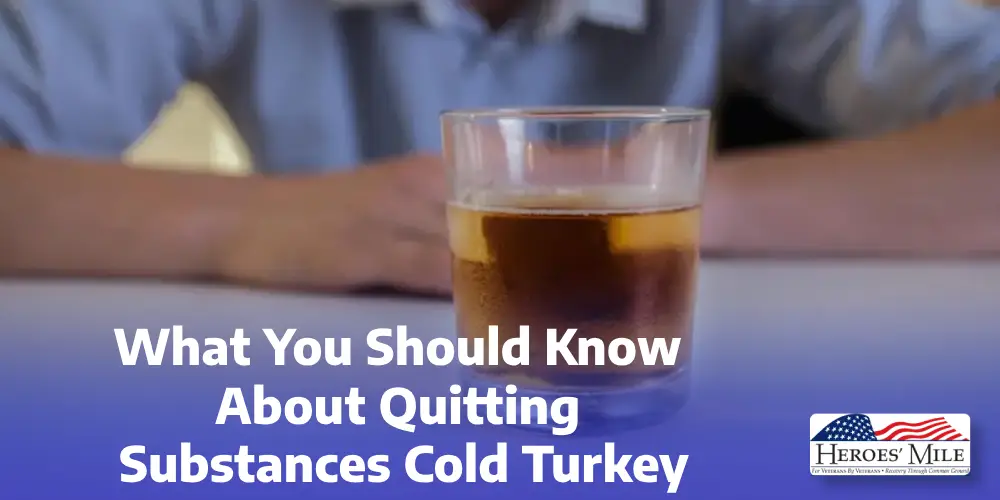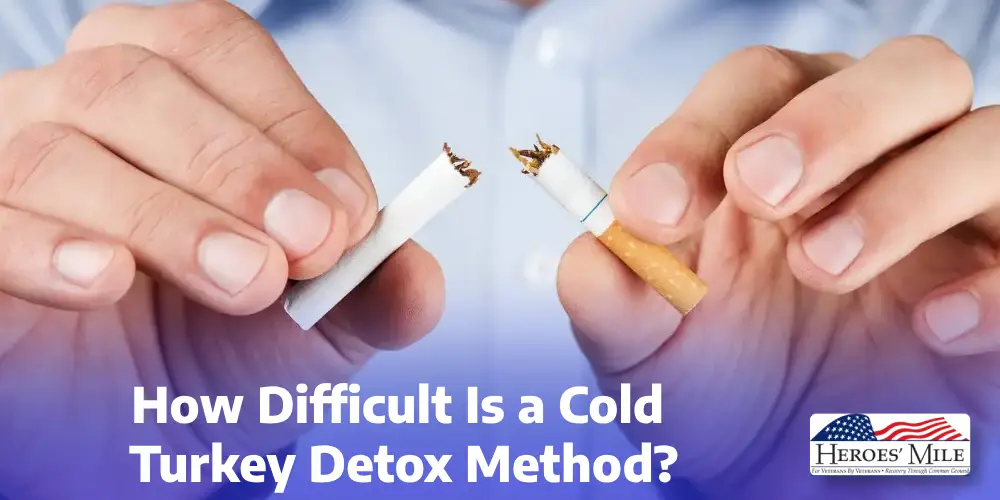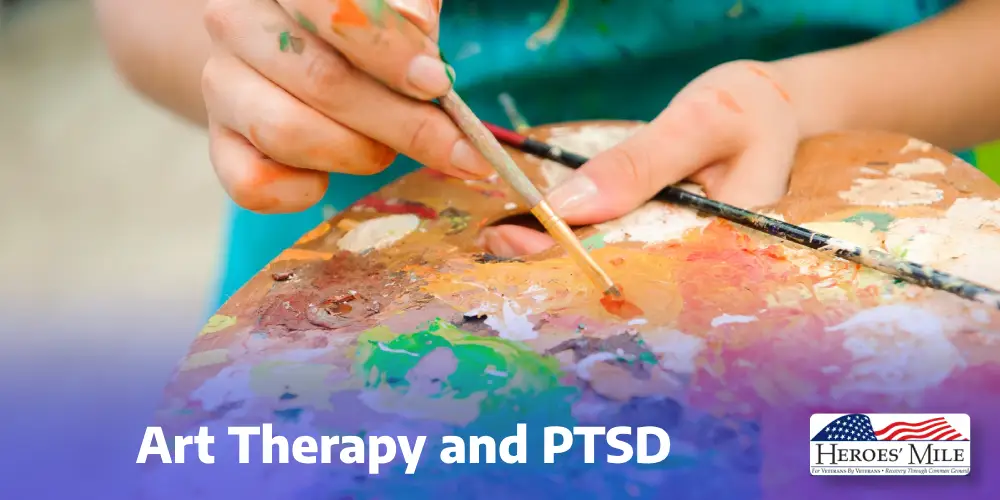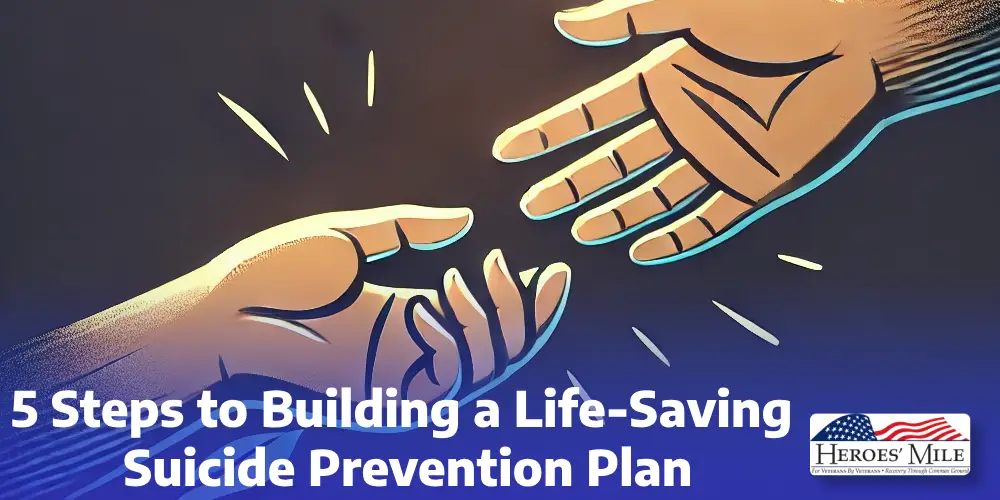Deciding to quit using a chosen substance is the first step toward a drug-free life. However, many of those who struggle with drug use avoid seeking addiction help for Veterans. Instead of choosing the safest way to overcome their physical dependence on the substance, they are quitting substances cold turkey.
What You Should Know About Quitting Substances Cold Turkey

What You Should Know About Quitting Substances Cold Turkey
What’s Does Quitting Cold Turkey Mean and How Does It Differ from Joining a Detoxification Program?
When a person quits cold turkey, they stop taking tobacco, alcohol, or drugs abruptly. In most cases, cold turkey methods are done at home without medical assistance or outside intervention.
Alternatively, detoxification refers to the process of naturally purging toxic substances from the body with the help of an integrated treatment program. Joining a good detoxification program means detoxifying in a safe and controlled environment where professional help is always available. Moreover, the time it takes to complete the detox process depends on the amount and intensity of drug usage.
What Makes Quitting Cold Turkey Appealing?
Many of those who decide to quit cold turkey do so because they think it’s easier for them to avoid the drug entirely than to taper off. Most of them prefer to quit on their own in the privacy of their home to avoid financial worries or to be away from the judgment and scrutiny of others. During the process, they try to steer clear of people, places, or anything that reminds them of the substance they’re addicted to.
Is Quitting Cold Turkey Safe?
Using the cold turkey approach may be a safe and effective method for individuals quitting cigarette smoking and low-level alcohol addiction. However, the success of this approach heavily depends on the amount of support a person gets while they’re trying to quit.
It’s important to note that substance addiction is a chronic disease that presents a high relapse rate. It can be potentially life-threatening for those who struggle with serious alcohol dependence or severe drug addiction.
Since quitting cold turkey robs the human body of the time it needs to return to its non-addictive state, it brings on intense drug cravings and extremely uncomfortable withdrawal symptoms that increase the risk of relapse. If a person relapses and takes their usual amount of the substance, they have a higher risk of overdose.
How Difficult Is a Cold Turkey Detox Method?

How Difficult Is a Cold Turkey Detox Method?
Although a person may think they’re capable of a cold turkey detox method, only a few people manage to succeed. Once a dependence on a substance has formed, the user has to constantly resist their physical cravings and fight against their mental obsessions.
For this reason, quitting cold turkey without medical supervision sets the stage for relapse at some point. Unless the person seeks professional help, they won’t receive the medical and clinical support to recover.
What Happens to the Body When You Abruptly Stop Using Drugs?
If a person struggles with active substance addiction, their minds and bodies are likely dependent on the chemicals on that substance. Abruptly taking these chemicals out of their system triggers unpleasant withdrawal symptoms.
Moreover, withdrawal side effects involve a collection of symptoms, ranging from mild to severe, that impact a person’s physical, mental, and emotional state. Moreover, these symptoms can last for a few days or even a couple of weeks. Some of the most common withdrawal symptoms include the following:
Physical Symptoms of Withdrawal
- Loss of appetite
- Nausea and vomiting
- Fatigue
- Muscle aches
- Insomnia
- Sweating
- Cold, clammy skin
- Headache
- Dizziness
- Diarrhea
- Runny nose
- Goosebumps
- Tremors
- Irregular heart rate
- Changes in blood pressure
- Stomach cramping
- Seizures
- Hyperthermia
- Coma
Mental and Emotional Symptoms of Withdrawal
- Mood swings
- Hostility toward others
- Mental fogginess
- Pain sensitivity
- Delusions
- Hallucinations
- Paranoia
- Depression
- Anxiety
- Confusion
- Restlessness
- Irritability
- Cravings for the substance
What Factors Influence the Progression of Withdrawal and Risks of Quitting Cold Turkey at Home?
- The Substance the Individual is Addicted To
The severity and type of withdrawal symptoms depend on the kind of substance the body is dependent on. Highly addictive substances such as cocaine, heroin, benzodiazepines, methamphetamine, opioids, prescription stimulants, and alcohol can cause severe withdrawal symptoms.
- Length and Severity of the Addiction
The more often a person uses a substance and the larger doses they use at a time will increase their body’s dependence on the drug or alcohol. When their level of dependency is higher, they’ll experience more intense withdrawal symptoms.
- The Method Used In Substance Abuse
When it comes to substance abuse, the most common methods used include smoking, drinking, and injecting. When drugs are smoked or injected, they go into the body’s system with minor hindrance and at a faster rate than when the user ingests them.
- Co-occurring Mental Health or Medical Conditions
Cold turkey detox can become even more unpredictable and dangerous when the user is diagnosed with a co-occurring psychological or medical condition. For example, their risk of experiencing severe withdrawal symptoms is higher if an existing medical condition impacts their heart rate or blood pressure. Likewise, a user with a current mental health disorder is at risk for increased psychosis, anxiety, or self-harm.
What Is the Safest Route to a Drug-free Life?
The safest way to quit alcohol, an opiate, or a benzodiazepine is under the management of a physician who has special training in addiction medicine. They can prescribe medication that can significantly minimize the effects of withdrawal. Moreover, a full staff of medical personnel should also be present to provide nutrition, hydration, and medications intravenously in case of a medical emergency.
Video
They got pregnant with ‘Ozempic babies’ and quit the drug cold turkey. Then came the side effects. – USA Today
Women across the country have been bonding online over their “Ozempic babies” − surprise pregnancies while taking weight loss medications, despite being on birth control or having a history of fertility issues. Now, some of them say they’re experiencing intense symptoms such as extreme hunger and rapid weight gain after quitting these drugs cold turkey to protect their baby’s health.
News Audio
To Quit Smoking, It’s Best To Go Cold Turkey – NPR
Nicola Lindson-Hawley remembers how hard it was for her mom to stop smoking. By studying about 700 adult smokers, she found out that her mom quit the right way — by going cold turkey. The results are out in the current issue of Annals of Internal Medicine.
FAQ
- Is it safe to quit substances cold turkey?
Quitting substances cold turkey can be dangerous, especially for alcohol, opioids, or benzodiazepines. It’s best to seek medical advice before attempting to quit. - What are the common withdrawal symptoms?
Withdrawal symptoms can include anxiety, nausea, headaches, sweating, and in severe cases, seizures or hallucinations. - How long does withdrawal last?
The duration of withdrawal varies depending on the substance and individual. It typically lasts from a few days to a few weeks. - Can I detox at home without medical supervision?
Detoxing at home without medical supervision is not recommended for certain substances due to the risk of severe withdrawal symptoms. - Are there alternatives to quitting cold turkey?
Medical detox programs offer gradual tapering and medications to ease withdrawal symptoms, making the process safer and more comfortable.



